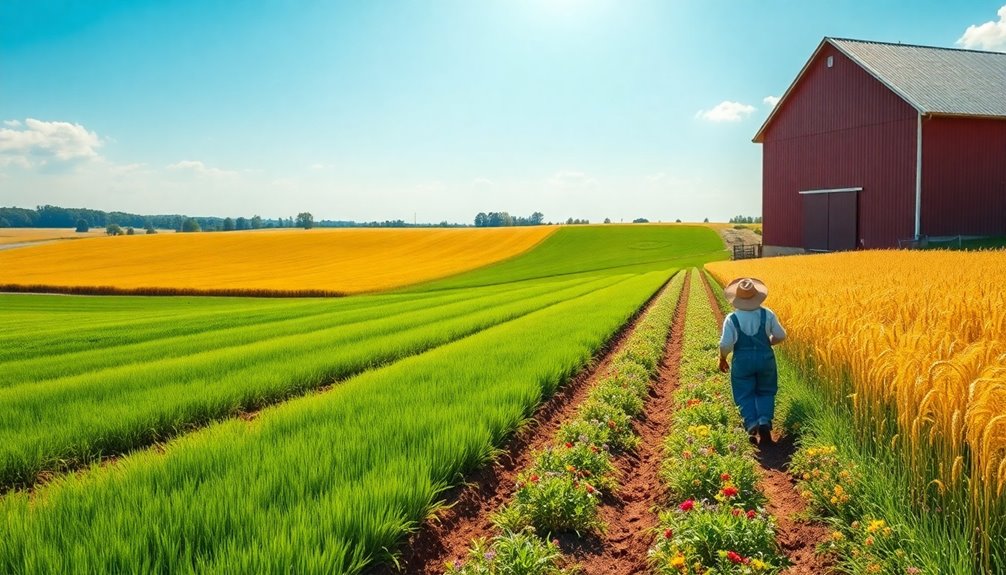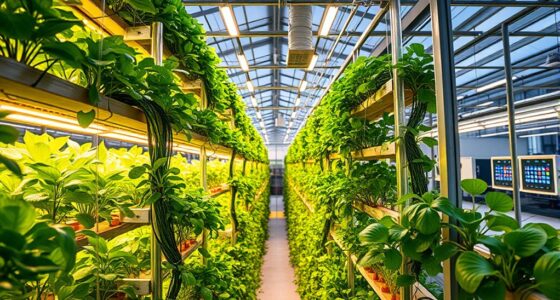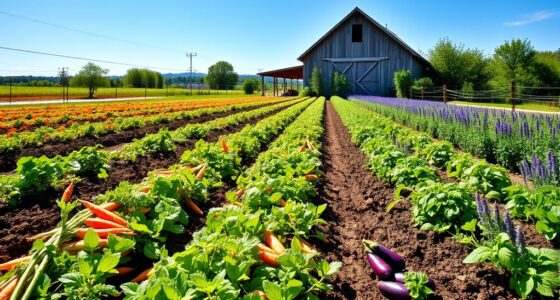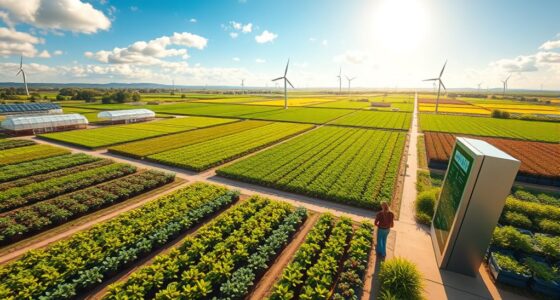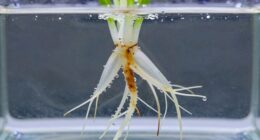Farming is all about growing crops and raising animals for food and other products that feed people and support economies. You prepare the soil, plant seeds, manage pests, and harvest your yield. There are different practices, like conventional, organic, and sustainable farming, each with its own approach to land and resources. Farming not only creates jobs but also fuels economic growth and helps guarantee food security for everyone. Plus, it's important to understand how sustainable practices can benefit both your output and the environment. Stick around to uncover more details about the fascinating world of agriculture.
Key Takeaways
- Farming is the practice of cultivating crops and raising livestock for food and agricultural products, essential for food security.
- It includes activities like soil preparation, planting, pest control, and harvesting, emphasizing sustainable methods for long-term productivity.
- There are various farming practices, such as conventional, organic, and sustainable farming, each with distinct approaches and impacts on the environment.
- Economic factors, including market prices and input costs, significantly influence farming profitability and practices in rural areas.
- Sustainable farming practices aim to enhance soil health and biodiversity while minimizing environmental impacts like nutrient runoff and water usage.
Definition of Farming

When you think about farming, you're considering the essential practice of cultivating crops and raising livestock for food and other agricultural products.
Farming encompasses a range of activities, from soil preparation and planting to pest control and harvesting, all important for effective food production. Various farming methods, including crop rotation and sustainable practices, enhance soil health and yield.
You can engage in crop production, classified under Codes 111, or animal production, falling under Code 112, showcasing the diversity in farming.
Whether you operate a small subsistence farm or a large-scale commercial enterprise, your efforts contribute to local and global food security and economic stability.
Farming isn't just a job; it's a fundamental part of our survival and growth.
Importance of Agriculture

Farming plays a significant role in agriculture, which is essential for global food security. It provides the food supply necessary to sustain populations and supports economic growth.
Here's why agriculture matters:
- Economic Significance: Agriculture contributes approximately 3.4% to the global GDP and employs around 1 billion people, highlighting its role in job creation.
- Food Diversity: Through crop production and livestock raising, farming guarantees a variety of plant-based and animal-based food products are available.
- Sustainability: Adopting sustainable agricultural practices helps maintain soil health and biodiversity, addressing environmental challenges like climate change.
Types of Farming Practices
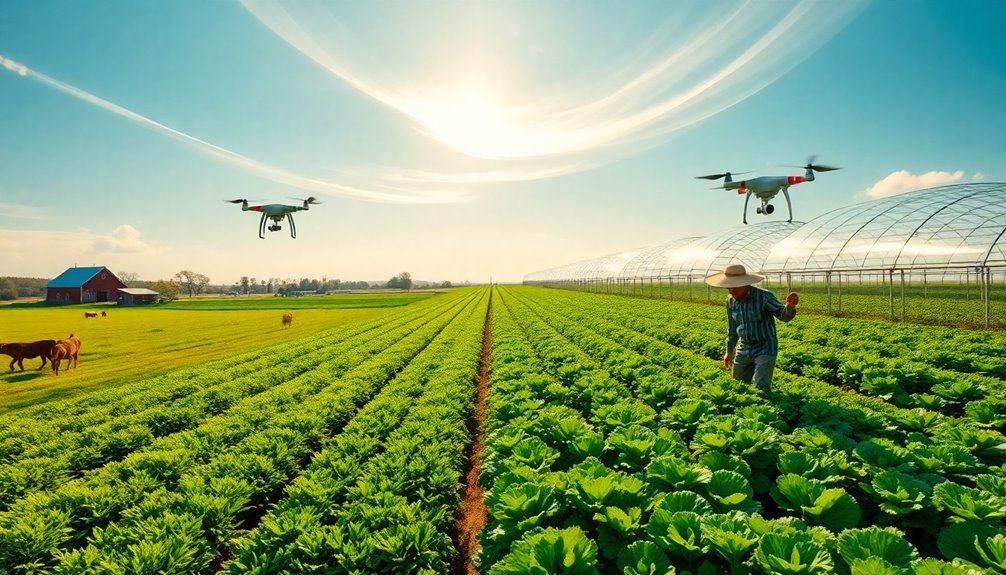
While the methods used in agriculture can vary widely, understanding the different types of farming practices is essential for anyone interested in food production and sustainability.
Conventional farming relies on synthetic fertilizers and pest control to maximize crop yields, but it can impact nutrients in the soil.
In contrast, organic farming focuses on sustainability by avoiding synthetic chemicals and enhancing soil health through crop rotation and composting.
Sustainable farming combines productivity with environmental stewardship using methods like agroforestry and cover cropping.
Livestock farming involves raising animals for various animal products, employing systems like free-range or rotational grazing that affect land use and animal welfare.
Additionally, aquaculture cultivates aquatic organisms, promoting efficiency and sustainability in food production. The practices of sustainable wood-burning highlight the importance of balancing agricultural practices with environmental considerations.
Economic Factors in Farming

Economic factors play an essential role in shaping farming practices and outcomes. They directly influence how you manage your resources and the profitability of your agricultural endeavors.
Understanding these factors is important, especially in rural areas where agriculture is a primary income source. Here are three key economic considerations:
- Market Prices: Fluctuations can notably impact your income from agricultural products.
- Input Costs: Rising costs for seeds, equipment, and labor require careful resource management to maintain profitability.
- Local Farmer Associations: Joining these can improve market access and enhance collaboration, helping you navigate economic challenges effectively.
Sustainability and Environmental Impact

Understanding economic factors in farming naturally leads to a discussion about sustainability and environmental impact.
Sustainable farming practices, like crop rotation and cover cropping, enhance soil health while reducing chemical dependency. This approach promotes biodiversity and strengthens ecosystem resilience.
In contrast, conventional methods often rely on excessive nitrogen and phosphorus fertilizers, resulting in nutrient runoff that contributes to eutrophication and dead zones in aquatic ecosystems.
Additionally, agricultural irrigation systems withdraw 70% of global freshwater, harming local environments. Monoculture farming increases disease vulnerability and depletes soil nutrients, compromising long-term agricultural productivity.
Heavy pesticide use poses health risks not just to pests, but also to beneficial insects and potentially humans, highlighting the urgent need for more sustainable and environmentally friendly farming approaches.
Frequently Asked Questions
What Is the Full Meaning of Farming?
Farming's full meaning revolves around the cultivation of crops and the raising of livestock.
It's all about producing food, fiber, and other essential products that sustain communities and economies.
You engage in various activities like soil preparation, planting, and harvesting, which require skill and knowledge.
What Are the Basics of Farming?
You won't believe how crucial the basics of farming are! At its core, farming's all about growing crops and raising animals.
You'll immerse yourself in methods like crop rotation to keep your soil healthy and irrigation to quench thirsty plants.
There's a world of farming styles—organic, conventional, sustainable—each with its unique flair.
Embracing technology can boost your yields, making farming not just a job, but a crucial part of life and the economy!
What's the Difference Between Farming and Agriculture?
When you think about farming and agriculture, it's important to see the distinction.
Farming focuses on the daily tasks of growing crops and raising livestock. In contrast, agriculture encompasses a much broader scope, including research, policy-making, and food production systems.
So, while you're managing a farm, agriculture involves the entire industry that supports and influences farming practices.
Understanding this difference helps you appreciate the complexities of food production and its impact on society.
What Is Considered Farming?
Farming is considered the practice of cultivating land and raising animals. It involves activities like planting crops, caring for livestock, and harvesting produce.
You might engage in various types of farming, such as organic or conventional, depending on your goals and methods. Farming isn't just about food; it can also include fiber and other products.
Ultimately, it plays a significant role in your community's economy and food security.
Conclusion
In farming, you reap what you sow, and understanding the basics of agriculture is key to thriving in this essential field. By grasping the definition and importance of farming, along with its various practices and economic factors, you can appreciate its role in our lives. Embracing sustainability guarantees that farming can nourish future generations while protecting our planet. So, immerse yourself in the world of agriculture and cultivate your knowledge—it's a rewarding journey!

